Why Tamales Elena y Antojitos is L.A.’s most vital new Mexican restaurant
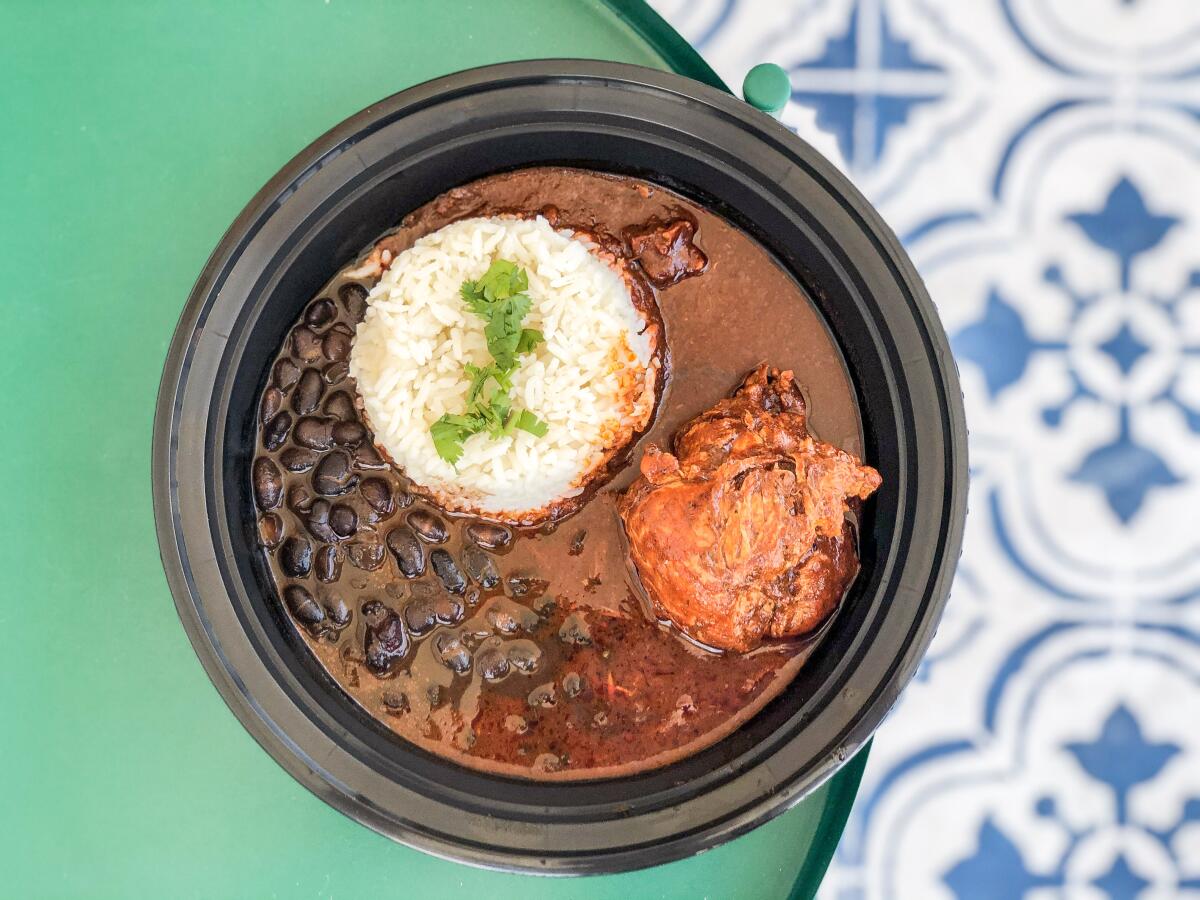
- Share via
The pozole verde at Tamales Elena y Antojitos in Bell Gardens is a dish to savor in stages. Start at the baseline, with a spoonful of broth.
Maria Elena Lorenzo, matriarch of the family that runs the restaurant, mixes pork and chicken in her pozole stock. A puree of tomatillos, serranos, pumpkin seeds, cilantro and other herbs tints the soup the pale green of Haas avocado flesh. The flavors are orchestral: warm bass tones from the slowly simmered meats, reedy octave jumps from the aromatics.
Add garnishes to stack the harmonies: radishes, chopped cabbage, a slip of avocado, cilantro leaves plucked from their stems, several quarter-moons of lime. Crumble in a wedge of queso fresco, or leave it whole for the Instagram shot. Break fried tortillas into shards and scatter them with chicharrones; mingling with the hominy that simmered in the stock, their presence is pleasing even as their crispness begins to fade. To finish, crush chile de árbol flakes and dried oregano between your fingers as you sprinkle them over the top.
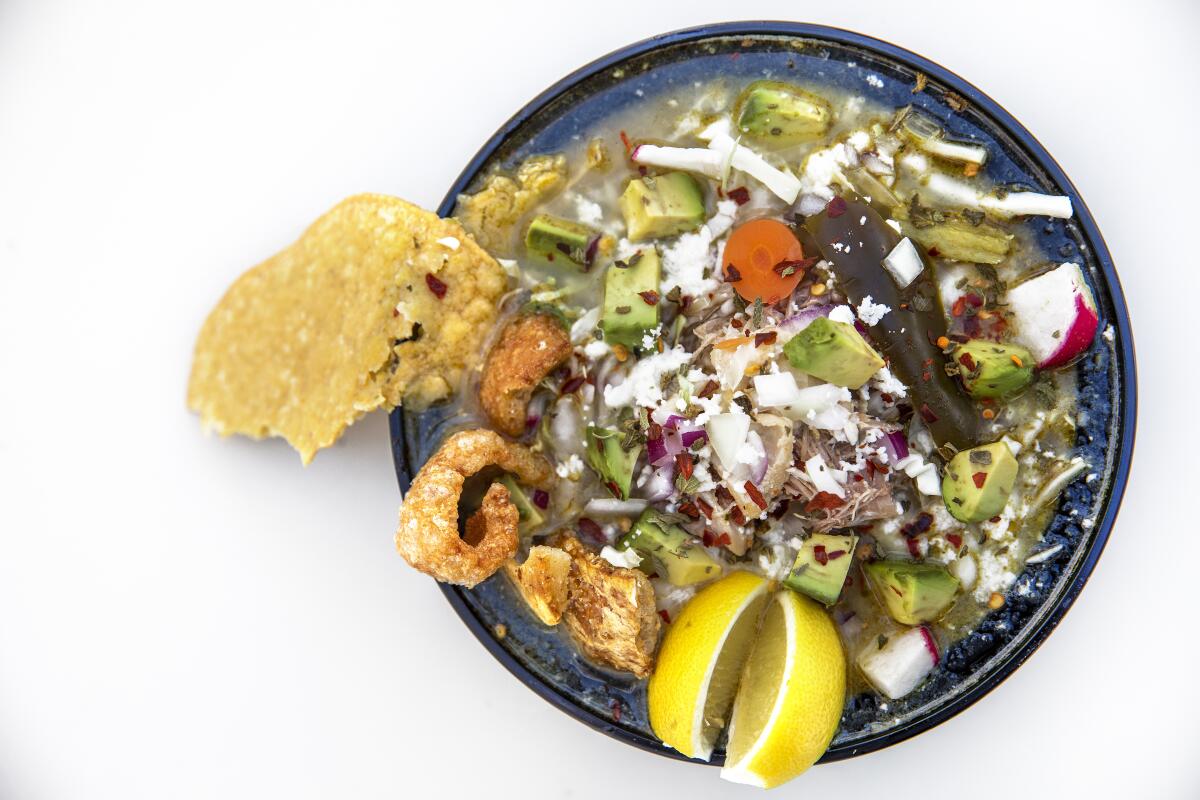
Even in a takeout bowl, the sight of the adorned pozole is stirring. Each varied bite urges you to the next; the last teaspoons of broth hum with citrus and musk and heat.
Lorenzo’s recipe, like each of the two dozen menu items at Tamales Elena y Antojitos, illuminates the Afro-Mexican cooking of Costa Chica, a hilly stretch along the southern coast of the state of Guerrero between Acapulco and the border of Oaxaca. The African heritage among the region’s population is little known to the world, even in other areas of Mexico; 2020 marks the first year Afro-Mexicans will be included as part of the country’s census.
“Guerrero is the California of the United States — a melting pot of cultures,” says Maria Irra, one of Lorenzo’s five daughters.
The restaurant, sandwiched between two tienditas at a sunny intersection, opened in July, an expansion in the family business that has been nearly 30 years in the making. Most every Los Angeles media outlet covered its launch at least in passing; an Afro-Mexican restaurant is a singularity, even in a city as steeped in Mexican heritage as ours. It felt appropriate, after my first mind-opening takeout meal, to keep returning and more thoughtfully considering Tamales Elena y Antojitos and how it came into being.
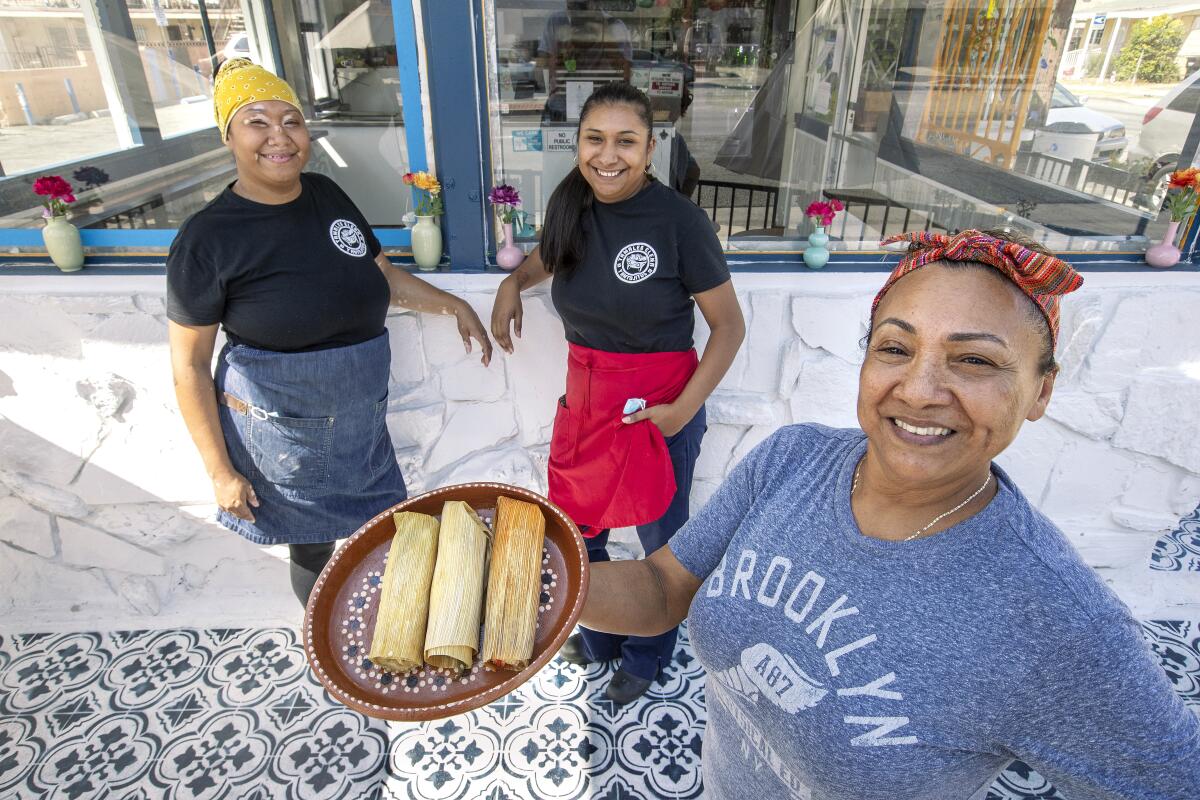
Lorenzo and her husband, Juan Irra, met cooking in a hotel in Acapulco. They arrived in the United States with young daughters in the 1990s, becoming permanent residents during the Obama administration. They have been fixtures in the Watts community for three decades, selling Lorenzo’s nourishing tamales (and eventually tacos and other dishes) to students and neighbors, first from carts and then from a food truck they bought in 2007 and continue to operate.
The daughters — Nayeli Irra, Judept Irra, Heidi Irra, Maria Irra and Teresa Irra — have helped with the truck for years by making tortillas, prepping vegetables and balancing salsas. They also have pursued their own culinary careers. Maria credits their opportunities in part to food writer and arbiter Bill Esparza, who befriended the family and opened doors in the industry by bringing chefs and restaurateurs like Bill Chait to their house for meals of Guerrerense specialties. The collective résumés for the five women include kitchen stints at Guerrilla Tacos, Mezcalero, Petty Cash and Chica’s Tacos.
Judept worked at John Sedlar’s Rivera before it closed in 2014, and she leads the kitchen at Tamales Elena y Antojitos.
Southern California’s tamale culture runs deep and regional. In an afternoon you can drive across the metro area and collect Oaxacan mole tamales from Gish Bac and Guelaguetza; a giant, achiote-stained, Yucatecan-style fried tamal from Chichén Itzá; Nayarit versions from Rosy’s studded with vegetables; and the hefty, husk-wrapped paragons, based on a recipe from Jalisco, from Me Gusta Gourmet Tamales.
That’s only for starters, certainly. But whether you choose to carry out from Tamales Elena y Antojitos, dine at one of several well-spaced tables on the restaurant’s small patio or take advantage of the drive-thru window, you probably should order a couple of the namesake specialties. Among the tamales bundled in husks, the queso con jalapeño soothes as much as it burns, and one sweetened with piloncillo delivers a molasses-like richness.
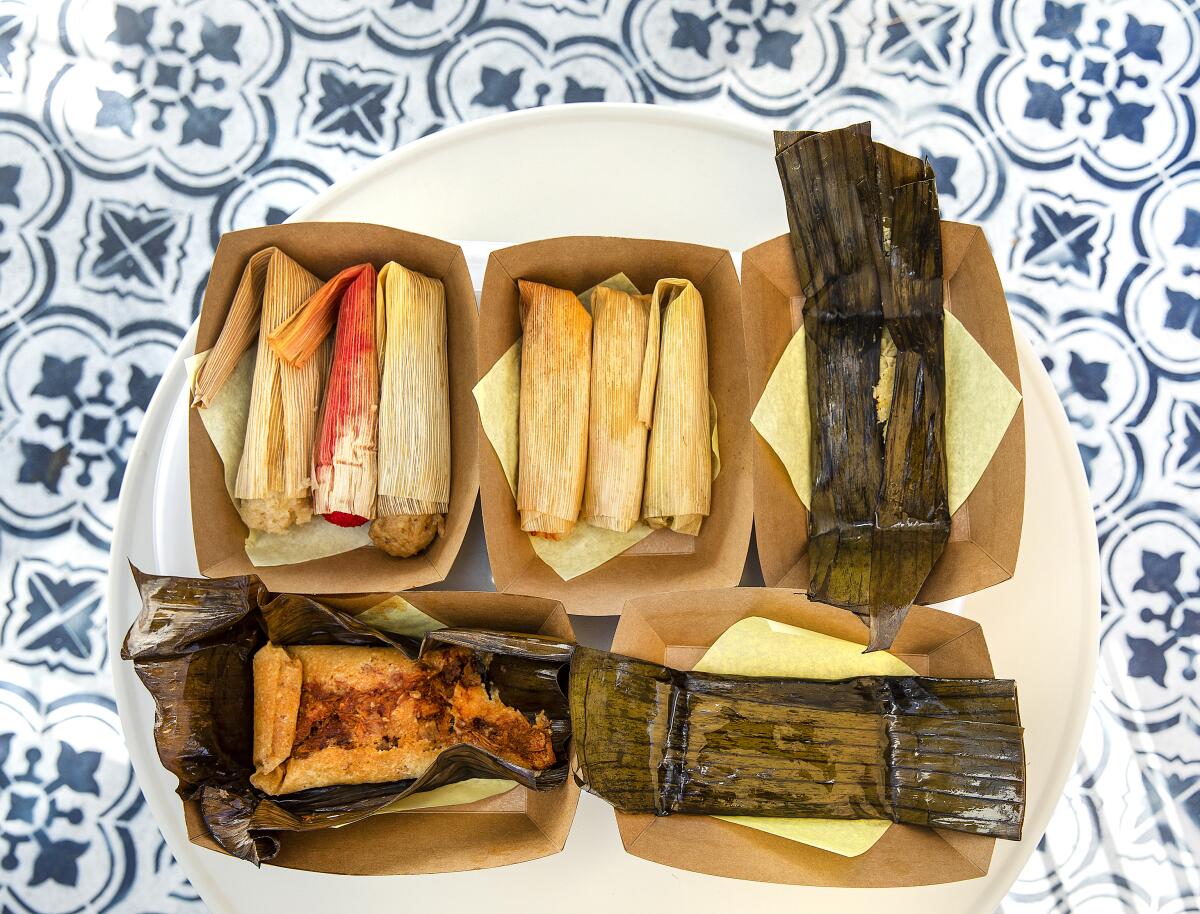
The more profound treasures are the Guerrero-style tamales — thin layers of masa steamed in banana leaves. The versions made with pork in red salsa or chicken in green salsa create an overall texture that teeters between soft and crumbly. Before pouring the extra salsas on the side over the tamales, it’s worth tasting them on their own to consider their nuances: the acidic nip of the verde, the smooth smokiness of the rojo.
Delve further: The antojitos (snacks or, literally, “little cravings”) include picadas, a street food of thick tortillas painted with red or green salsa and pinched around the edges to form a border that holds beans, crema and onions. “They’re not sopes,” Maria says emphatically. They fill you quickly, as will a few sublime pescadillas — piquant fish fried in tortillas slightly larger than your palm.
Though the restaurant’s name emphasizes small, casual noshes, stews and other substantial dishes on the menu more fully convey the complexities of the family’s repertoire.
Guerrero has its own mole traditions, most wonderfully reflected in the restaurant’s mole costeño. Cinnamon drifts through the brick-red sauce, but it’s offset by chile costeño, a dried red pod with a dusky sort of spice. The overarching effect is more earthy than sweet.
For a lengua stew, Judept grills tomatoes and peppers, blitzes them together with onions, garlic and very ripe plantain, and then fries the sauce in oil until the ingredients cook down to velvet. It cloaks sliced tongue overlaid with lobes of fried plantains and a jagged cloud of rice alongside. As with the pozole, it’s a masterclass in stratified flavors and textures.
Aporreadillo is a Guerrerense pairing of steak and eggs. Beef is salted, shredded and cooked to a crisp: It reminds me of machaca, the dried meat popular in Northern Mexico, though the preparation here differs. Stirred into eggs until scrambled bundles form, it’s fantastic for breakfast, though the dish is eaten in Guerrero for lunch or dinner as well. Tamales Elena y Antojitos opens in the morning; for a classic breakfast, the chilaquiles, with runny egg yolks and crackling, chile-stained tortillas, brings the kind of comfort many of us currently seek.
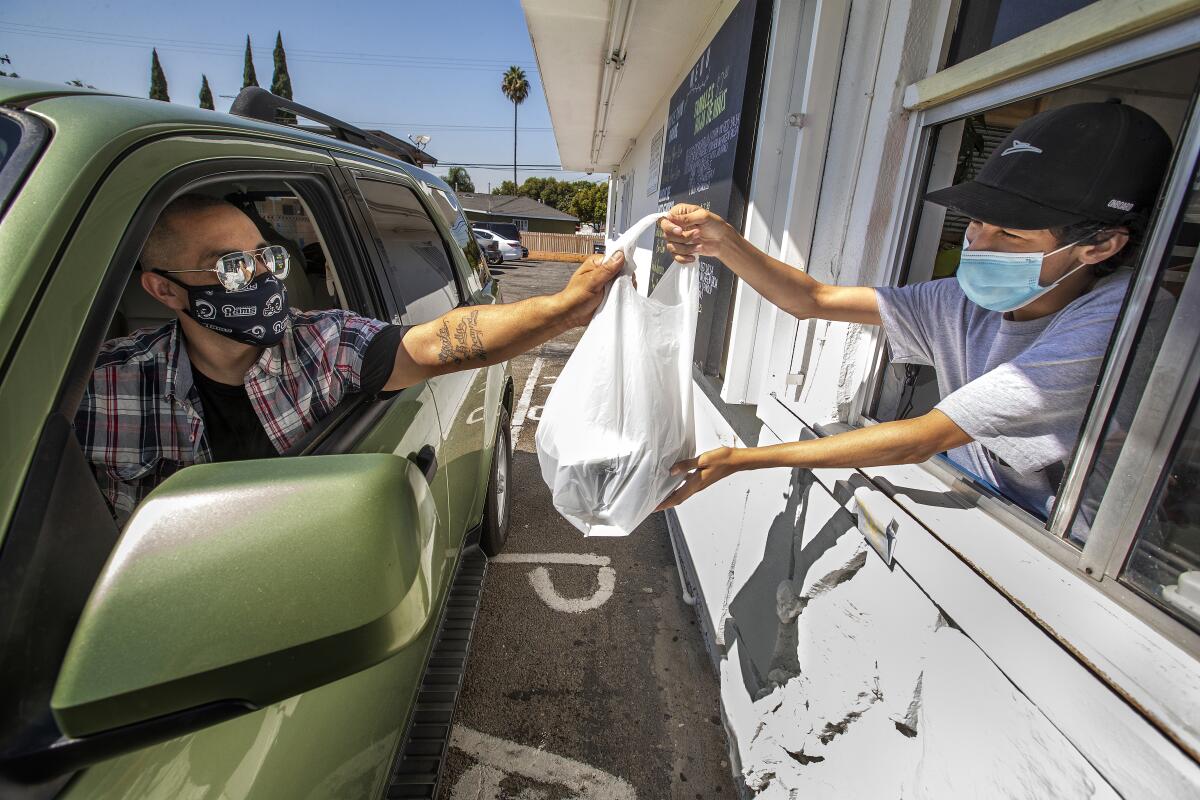
Chilate, perhaps sipped as you head home with extra tamales, winds up a meal any time of day. It’s a mood-boosting drink of cocoa, rice, cinnamon and sugar — another pride of Guerrero, another example of what makes Tamales Elena y Antojitos a place unlike any other, another reminder that, even in the chaos of the moment, restaurants can engender community, insight and possibility.
8101 Garfield Ave., Bell Gardens, (562) 674-3043, instagram.com/tamaleselenayantojitos
More to Read
Eat your way across L.A.
Get our weekly Tasting Notes newsletter for reviews, news and more.
You may occasionally receive promotional content from the Los Angeles Times.










